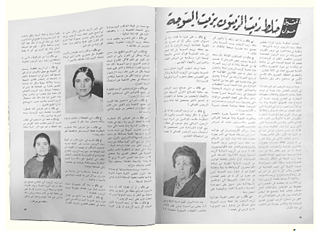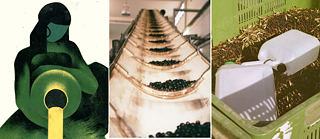It goes without saying that olive oil is tremendously valuable in Tunisia, in cultural, ecological, spiritual, and economic ways. Tunisia is one of the top producing countries of olive oil in the world and because a majority of its olive plantations are grown according to centuries-old traditions, it could potentially offer the highest quantity of ‘organic’ olive oil to the global market, if the official labels were granted.
The overarching structures that influence the cultivation and pressing of olives, however, do not generally reflect the population’s strong connection with and deep respect for this staple. Small scale producers struggle in silos to produce efficiently and reach profitable markets. There is no unified strategy for improving quality and exporting abroad sustainably. And for local consumers, experts describe the market as ‘total anarchy.’How can we understand the current situation and work towards a better-functioning, more just system? We will first paint a general picture of the industry as is, and then zoom in on a few ideas and groups aiming to improve the conditions and quality of olive oil production for all actors involved.
Let’s start from the ground up. Who produces olives? Producers generally fall into two categories: those involved in every stage of the supply chain, and those that just have trees. In the first category, the Sfax-based CHO group gets the golden star. They are the biggest olive oil producer in Tunisia, with their own international subsidiary companies that facilitate the export of their products to more than 40 countries. Their products are bottled and amount to more than 55% of all of Tunisia’s bottled olive oil exports. They’re also the only company in Tunisia certified to do all of the necessary chemical and sensory quality examinations in-house. By cutting out all the intermediaries, their 6 brands are popular and affordable worldwide; they’ve even begun marketing olive oil for pets.
The second category, which makes up the majority of Tunisian producers, doesn’t face the same prospects. Small producers in this group sell their olives - or if they aren’t able to work their land themselves, even rent out their trees - to khadhara (fresh produce vendors). The khadhar sells the olives to a collector (a title given to one of the several intermediaries), who then sells the olives to a mill. The mill presses the olives into olive oil and will either export it or sell it to an exporter. Next, the exporter gets in contact with a broker, who makes deals for importers in other countries.
The further up the supply chain, the bigger the profit percentages. The brokers typically take 1%, the supermarkets up to 30%, of final sales. At this point,the amount the small producers were paid initially for their olives is negligible.
Soraya Hosni, anthropologist and founder of Clever Harvest, is attempting to address this dysfunctional arrangement from multiple angles. The startup Clever Harvest is supporting olive farmers in Tunisia to produce traceable products and streamline access to buyers, while its brainchild, the Sousse-based Harvest Lab, is making olive oil education accessible and communitary through events bringing together different actors in the field (local, national, and international) and their boutique, which offers educational olive oil tastings of top Tunisian olive oils.
In 2021, Clever Harvest trained 16 young people to work as “agritracers” who would ensure transparency in the food production cycle. To create olive oils with high levels of antioxidants and self-preserving qualities, olives must be picked, stored, transported, and processed in very particular ways. These agritracers learned the nuances of tasting olive oil and gained the knowledge to help producers attain high quality oils through various interventions (some as straightforward as prohibiting smoking in the milling area), all the while keeping digital traces of the steps of production for the sake of transparency.

Magazine “Al Mar'a” discussing policies related to the exportation of olive oil and the mixing of olive oil with soy oil. | ©National Library, Tunis.
On the government level, she questions the government’s logic for offering farmers subsidized olive trees (some of which come from other countries and are maladapted to Tunisian soil). Instead, she proposes a clever investment, “why doesn’t the government mass-certify all of the producers known to be organic?”
Without having to change anything materially, Tunisia could be producing upwards of 90% certified organic olive oil. Spain, which produces more olive oil than Tunisia, produces less than 10% organic
“By seeking to increase the production of olive oil for export and systematically reduce its domestic consumption, replacing it with substitutes less nutritious or even harmful to health, the Tunisian state deprives the population of its natural right to consume what it produces itself.”
“By seeking to increase the production of olive oil for export and systematically reduce its domestic consumption, replacing it with substitutes less nutritious or even harmful to health, the Tunisian state deprives the population of its natural right to consume what it produces itself.”
While only some remember defamation campaigns against olive oil when the policy of importing vegetable oils was ramping up, everyone can see its enduring impact: imported subsidized vegetable ‘blends’ take up more space than olive oil on market shelves.
Dhouha Mizouni Chtourou, an industry expert who has been involved across the entire value chain of olive oil and currently serves as a broker for international markets, stresses the urgency of educating Tunisian consumers. A particular concern of hers is the purchasing of lampante olive oil (a quality so low that it is not fit for human consumption) in informal markets.

Cover of "Feuille D'informations Oleïcoles" | ©Office National de l'Huile. 1948
This situation is exacerbated by the lack of quality controls for the domestic market. “You can’t be sure of anything,” she warns. Dhouha also sits on a certified panel of olive oil tasters (tasting panels are composed of 7 - 12 people), who are tasked with classifying olive oil into commercial categories solely through organoleptic (sensory) testing. While these private panels - certified by the International Olive Council - are on the rise in Tunisia (in 2014 there was only one, now there are more than 20), Dhouha wants to see that all Tunisians have an intimate understanding of this complex oil:
“We have dozens of magnificent varieties that most people don’t know about but we don't know where to find or how to consume the precious products of our land. We should be working with children, so later when they buy olive oil they know what quality is. It's not magic, you know, it’s easy to learn.”
Improving the image and place of olive oil within Tunisia could benefit the entire country, whereas exporting oil cheaply to Europe, which then gets bottled and sold as a ‘European blend,’ benefits very few people.
Imagine: airports could be lined with information on Tunisian olive oil brands. Hotels could offer olive oil tastings and sell local brands in their gift shop. Instead, many tourists leave with no exposure to Tunisian olive oil. Improving the image and place of olive oil within Tunisia could benefit the entire country, whereas exporting oil cheaply to Europe, which then gets bottled and sold as a ‘European blend,’ benefits very few people.
On this note, let us move to the issue of exportation. Dhouha explains that most of Tunisian oil goes to Spain, in bulk. After Spain, the second and third biggest markets are Italy and the U.S. The difference is big between Spain and the U.S. Spain imports 200,000 tons, and the U.S. 40,000 tons. Spanish traders take Tunisian oil, mix it, and send it to the US. Why doesn’t Tunisia export directly to the US? “Because we simply don’t understand the market well enough,” Dhouha says. Dali Boubaker, owner of the award-winning extra virgin olive oil brand Olissey, agrees that many producers act as “lone wolves.” They could all be benefited greatly, he suggests, by working together more as cooperatives, for example to collectively buy and operate a mill, which facilitates the quick processing necessary for higher grades of olive oil.
Europe is often wrongly considered as the biggest consumer of olive oil. Rather, they’re the biggest importers, because they resell it. The U.S. is the highest consuming non-producing country. They consume 450,000 tons annually, yet they only produce 2% of this. European countries make much more value buying from Tunisia and reselling it at European prices, even outside of Europe. Europeans mostly consume local oils. Soraya puts forth a simple formulation, “Italians consume more than they produce and export more than they produce. They consume 450,000 tons and export 600,000. Where do the 600,000 tons come from? All over the world.”
Rather than continuing to focus on the European market which has a “free exchange” trade policy with Tunisia, but not when it comes to olive oil, for which producers are charged an incredibly inhibiting 1.24 euros in taxes per liter of olive oil, Soraya recommends working instead with more profitable markets in the Americas, such as Brazil, Mexico, the U.S., and Canada.
There is much to be said about the economic short fallings and potential of the olive oil industry and as much to be said about the ecological violence enacted by economically-motivated practices that dominate the sector today. Not to be forgotten are the workers, especially women - often earning half of their male counterparts, who form the backbone of Tunisia’s agricultural industry. An urgent upscaling of both political and community-led initiatives should hold the protection of the land, and those who tend it, at the heart.
For a country that identifies with olive oil in important ways, it should be an imperative to establish an industry that gives back as much as it takes, in the hopes that future generations will be able to enjoy the gift of olive oil and share it in abundance.
This article was first published in Broudou Magazine.
December 2023
